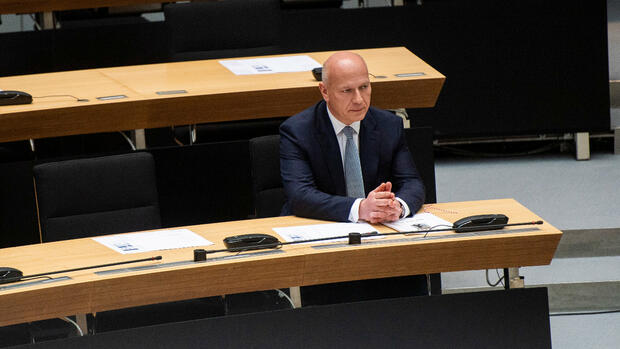Kai Wegner (CDU) was elected Governing Mayor of Berlin in the third ballot.
(Photo: dpa)
Berlin Why should the election of the Governing Mayor in Berlin be regulated when the election to the House of Representatives ended in chaos and had to be repeated after a little over a year?
In two rounds of voting, Kai Wegner (CDU) missed the necessary majority in the Berlin House of Representatives on Thursday to become head of government of a CDU/SPD coalition. When it came to the third and decisive ballot, the Left and the Greens called for the Council of Elders to be convened.
It was unclear how a third ballot would be held; The reasoning was that there had never been anything like this in the history of Berlin. The session in the House of Representatives was indeed adjourned. The Greens and the Left even requested that the election be postponed by two weeks.
The constitution leaves no doubt: After two unsuccessful ballots, “whoever receives the most votes in a further ballot” is elected. But it took a while before the third ballot came.
But then the 50-year-old knew: He is the new governing mayor, with the full number of votes from the CDU and SPD. “Kai, the Right”, “the lonely Kai”, “King without a country”, as he was dubbed for a long time by the political competition due to the lack of coalition options, stumbles into the red town hall of the four million metropolis with two black eyes.
>> Read here: The AfD hunter – CDU brings Deputy Head of the Office for the Protection of the Constitution to Berlin
After 22 years, a Christian Democrat is again ruling the capital. The father of three children, originally from Berlin from the less than glamorous district of Spandau, has achieved what many had hardly thought possible – not even the strategists of the federal party. For too long the Berlin CDU was at odds and disoriented, for too long the SPD and the left, together with the Greens, stood for the capital’s attitude towards life.
But will the chaos end now?
The CDU and SPD had decided that Berlin would function again. On this Thursday, however, it was the quarreling Social Democrats who caused confusion and spoiled Wegner’s good mood.
>> Read here: On Adenauer’s footsteps in Italy – the revival of the CDU
Previously, the members had only voted for the coalition with the CDU by a narrow majority. And so the majority of six votes in the first two ballots in the House of Representatives was not enough to spread optimism for the legislative period in the first ballot.
Wegner approaches opponents
Wegner approached the SPD and conceded a lot in terms of content and personnel. He had also united his own ranks after seizing power in the Berlin CDU and pushing aside the confidant of Angela Merkel and former Minister of State for Culture, Monika Grütters. Before that he sat inconspicuously in the Bundestag and had been a city commissioner.
It was then, under Wegner, the Berlin CDU that won the repeat election with more than 28 percent of the votes, because the coalition of SPD, Greens and Left Party only argued – and didn’t work much, be it in administration, on the street or just simply at elections. The party town is longing for some order. And now this election day.
Wegner wants to be measured by the fact that he creates order. All parties know that an administrative reform is necessary in order to clearly sort the tasks of the Senate (as state government) and districts (as municipalities) and to ensure efficiency. “The best for Berlin” have the CDU and SPD in the coalition agreement.
The power of the CDU in the Bundesrat is growing
Those comrades who oppose the coalition may find comfort in the fact that Wegner comes from a humble background. He grew up in his parents’ allotment garden, his father worked in construction and his mother worked as a saleswoman. Son Kai earned some extra money early on as a teenager until he trained as an insurance salesman and later rose to the management of a construction company himself.
Now his weight is also growing in the federal government: Qua office, he rises to the presidency and thus to the advisory group around Friedrich Merz. He is the face of the big city, he has to show convincingly that the CDU can score in the big cities with liberal issues like Ole von Beust in Hamburg or Petra Roth in Frankfurt.
For the time being, the CDU and CSU can look forward to four more votes in the Bundesrat after this day, which will increase their majority and thus their influence on federal politics.
More: The CDU targets the FDP voters – a comment
